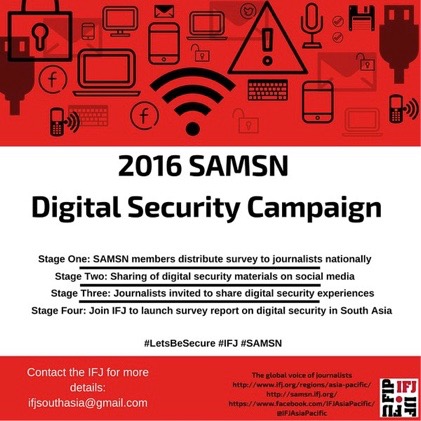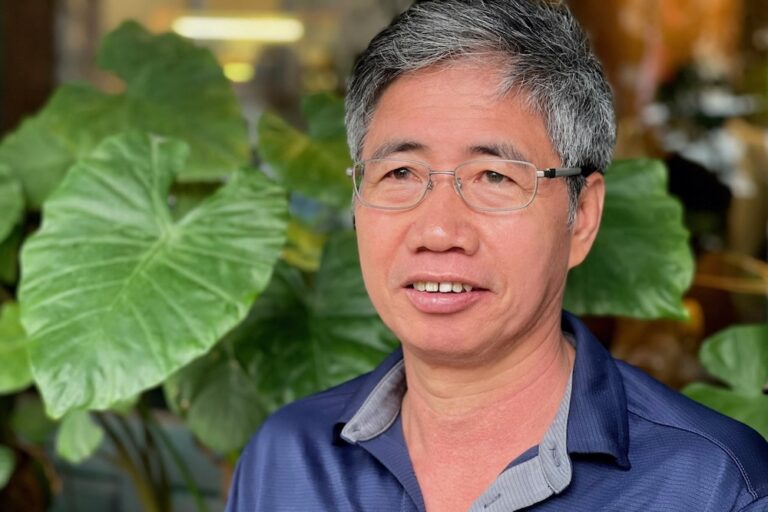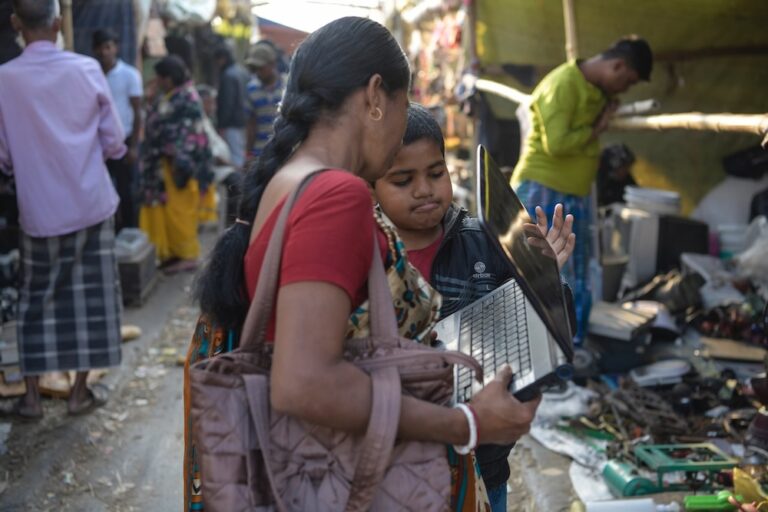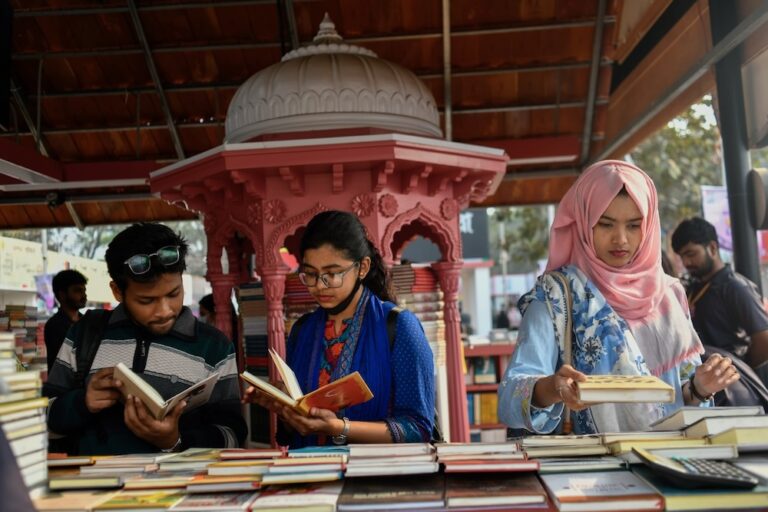In the April round-up: horrific attacks against secularists in Bangladesh, journalists arrested while protesting criminal defamation in the Maldives, crackdown on opposing voices in Cambodia, plus advocacy, awards and much more.
Bangladesh came under international spotlight in April as individuals with secular views and freethinkers were brutally killed for their work and expression.
On 6 April, law student and blogger Nazimuddin Samad, 28, was reportedly attacked with machetes by unidentified assailants before being shot, in Sutrapur, Dhaka. According to reports, Nazimuddin wrote regularly against religion on his Facebook page and was critical of radical Islamists.
Global reactions were immediate from organisations like PEN International, the Committee to Protect Journalists, Reporters Without Borders (RSF) and the International Federation of Journalists (IFJ), who condemned the attacks and called for measures to be put in place to protect bloggers like Nazimuddin.
But just weeks later, two others were killed, 58-year old English professor Rezaul Karim Siddique and the founder of Bangladesh’s only lesbian, gay bisexual and transgender (LGBT) magazine, Xulhaz Mannan. While Rezaul Karim had not been known to be vocal against religion, he was involved in organising cultural programs. The Islamic State of Iraq and the Levant (ISIL) claimed responsibility for the murder, accusing him of being an atheist. Xulhaz, 38, was aware of the risks he faced in advocating for gay rights in a country that has seen violent attacks against those with secular views. AJ+ features his story in this short video.
Five Bangladeshi freethinkers and writers were killed by assailants believed to be linked to Islamist organisations last year.
The UN Special Rapporteur on the promotion and protection of the rights to freedom of opinion and expression, David Kaye, was among those who commented on this latest brutal killing:
where is sense of urgency amg officials in #Bangladesh to protect activists & writers ag such terrible attacks? https://t.co/phMuH5AoBi
— David Kaye (@davidakaye) April 25, 2016
Criminal defamation
In Maldives, journalists were arrested as they conducted a peaceful protest on 3 April against a media crackdown, which included a proposal to reintroduce criminal defamation law, closure of a newspaper, Haveeru (including its website), and the protracted investigation into the 2014 disappearance of journalist Ahmed Rilwan.
According to the Maldives Independent, riot police used physical force and pepper spray to disperse the journalists and subsequently arrested 16 people. In a statement, the IFJ called on the government to drop any charges against the journalists and to reverse its actions that could stifle press freedom, a position echoed by RSF.
Civil society groups joined the media community to condemn the crackdown, among them the Maldivian Democracy Network.
“Absolute infringement on freedom of expression and media freedom alarming and intolerable” – MDN press statementhttps://t.co/gicN0ihYal
— Mv Democracy Network (@MDN_mv) April 6, 2016
W/ RTV journos @sampathmasiw and @MrLeevaan. The charges against journos are political. #FreeRaajjeTVJournalists pic.twitter.com/c609KlGah7
— Mohamed Junayd (@mjunayd) April 14, 2016
In Cambodia, the ruling party filed a complaint for defamation against prominent political analyst, Ou Virak, who is director of Future Forum, and a former executive director of the Cambodian Centre for Human Rights (CCHR). The Cambodian People’s Party (CPP) alleged that Virak had maligned the party in his radio interview on 26 April by suggesting that it was using an ongoing sex scandal to damage the political opposition. Several other activists were also arrested for making similar suggestions.
CPP leader and Prime Minister Hun Sen has been known to harass and target critics, and the CCHR expressed concern over the authorities’ handling of the situation amidst the worsening crackdown on civil society in Cambodia.
Global state of press freedom
Globally, reports were released assessing the state of media freedom by RSF, Freedom House and CPJ.
RSF’s 2016 press freedom index saw countries in the Pacific region and Sri Lanka showing the strongest growth, while the rest reported a significant deterioration or stagnation, including those in east Asia that had been previously regarded as regional models.
In its Attacks on the Press 2016, CPJ looks specifically at the sexualized violence and online harassment and more broadly, the intersection of gender and press freedom.
The key findings from the annual Freedom of the Press report show that press freedom declined to its lowest point in 12 years in 2015, with Bangladesh in Asia Pacific suffered among the largest declines.
In Japan, the UN Special Rapporteur David Kaye concluded his official visit in April, after his earlier trip scheduled for December 2015 was postponed by the government. Japan is only the third official country mission to have taken place in Asia Pacific for the mandate holder on the rights to freedom of expression and opinion, under the UN Human Rights Council, the others were Maldives in 2009 and South Korea in 2010. Speaking at a press conference after the visit, Kaye expressed concern that the country’s media independence was being jeopardized by government pressure and the dangerous culture of media associations. He however commended the country’s levels of internet freedom, saying it could be a role model for other nations.
Commenting on the findings, ARTICLE 19 issued a statement urging the government of Japan to “commit to respecting the editorial independence of media houses and the freedom of journalists.” Kaye’s full report will be submitted to the UN Human Rights Council in 2017.
More advocacy…
Sixteen regional and international groups, among them Human Rights Watch, ARTICLE 19, CPJ and RSF, issued a joint letter on 29 April, calling on the Thai government to release activist and journalist Somyot Prueksakasemsuk, who is serving a ten-year jail term for lese majeste. The letter was issued on the eve of his five-year anniversary in detention, which the groups claimed is in violation of Thailand’s international obligations on human rights protection. The signatories condemned the flaws and delays in the judicial proceedings against Somyot, including “the courts’ repeated refusals to grant him bail.”
PEN America has urged the authorities in China to end the harassment of veteran journalist Gao Yu, who is currently under detention and is in need for medical care. Letters of appeal can be sent to the Chinese authorities and its embassies abroad to express concern for Gao Yu’s well-being and rights and to grant her leave to travel to Germany for medical treatment.
Other actions during the month included a campaign to promote digital security for journalists in South Asia, launched by the IFJ and its affiliate, the South Asia Media Solidarity Network (SAMSN), and a Twitter chat organised by the Centre for Independent Journalism and its partners to protest plans to register political blogs and websites in Malaysia.
Should the govt force registration of blogs? Patutkah kerajaan mewajibkan pendaftaran blog? #BiarlahBlog
— CIJ Malaysia (@CIJ_Malaysia) April 21, 2016
Awards
On 13 April 2016, digital rights and privacy activists working on Asia were among the recipients at Index on Censorship’s freedom of expression awards. The two were Bolo Bhi under the campaigning category and GreatFire (an anonymous collective) for the digital activism category – both for their work related to fighting censorship of the internet in Pakistan and China, respectively. The other winners were Serge Bambara, a hip-hop artist from Burkina Faso, journalist and trainer Zaina Erhaim and artist Murad Subay from Yemen.
You can read more about the shortlist and the winners here.

Poster of SAMSN/IFJ digital security campaign



